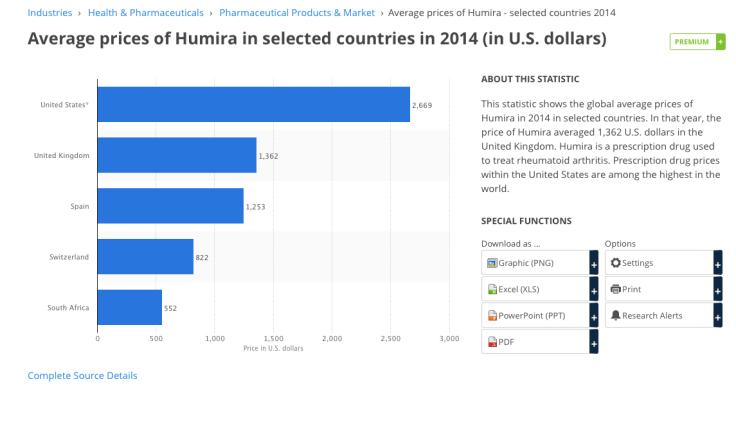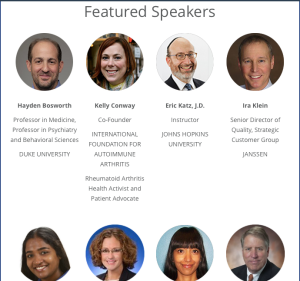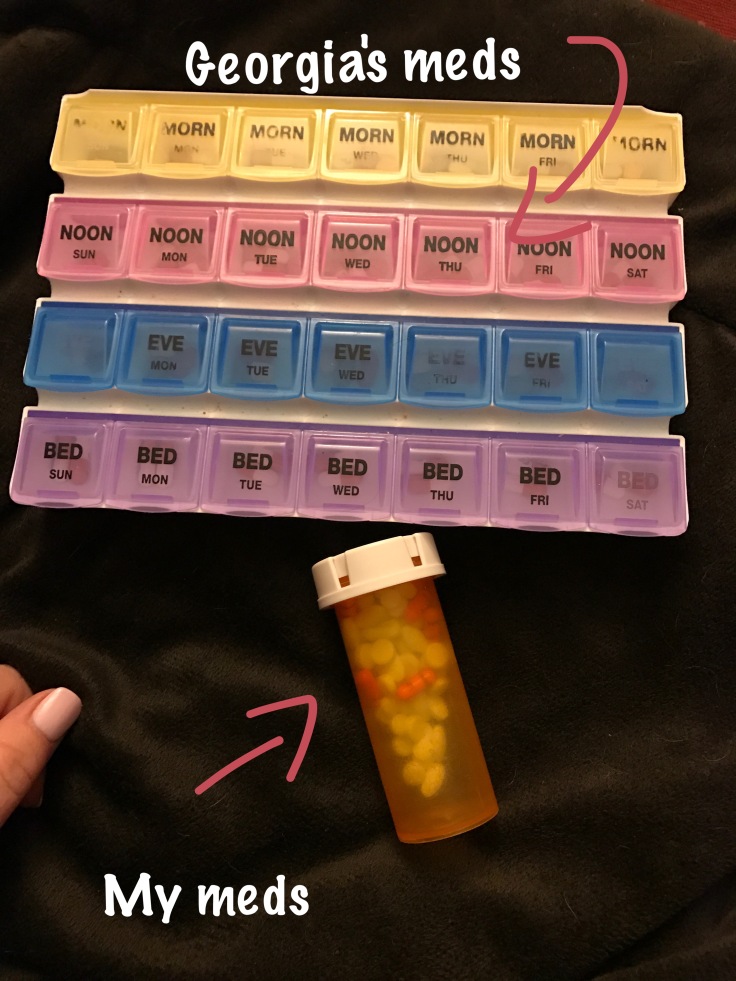A few months ago, my friend Jodi Seidler (2Hip Productions) contacted me and asked if I would be interested in sitting on a patient panel focusing on adherence with her at an eXL event in Philadelphia. The amazing MarlaJan DeFusco (Luck Fupas) would be one of the keynote speakers, so I was SUPER excited to join! I have previously spoken on the topic of patient adherence, so I felt like it was something I could manage. Due to my work schedule, I was not able to attend the full conference, but I was able to hear a few speakers and read the presentation slide that I missed. I was excited to be a part of this meeting and honored to be asked to present with Jodi.
So what is adherence? Well, in terms of patients it refers to how correctly a patient is taking a treatment as prescribed by the doctor with respect to timing, dosage, storage, etc., in order to get the best outcome the treatment can give. Access refers to how easily a patient is able to get the specific treatment. It should be a straight forward process. A patient is given a drug, they take it as prescribed, and they access it through a pharmacy or doctor’s office, etc. Simple right? Well the human experience is never straight forward. There are many barriers that prevent patients from adhering to and having access to treatment. Let me explain.
Barriers to adherence and access occur for many reasons. Here are two of my own personal examples of times where I did not adhere to my treatment directives.
Lack of adherence example 1:
I used to take methotrexate, a DMARD, which is a low dose chemo-therapy medication. You are not supposed to drink alcohol or go in the sun. Well, I used to rent a house at the Jersey Shore with friends every summer. I’m not a big drinker, but there were times that I wanted a margarita and hang out on the beach with my friends. I was young, single, and desperate to feel “normal”, so I would skip a dose. In the end, I stoped taking this drug because it made me lose a day a week to exhaustion and nausea. The side effects did not outweigh the positive effects of the drug.
Lack of adherence example 2:
In 2010, I stopped taking my biologic drug (voluntarily) for 6 months in order to travel to Uganda to provide speech-language therapy to orphans. It was a once in a lifetime opportunity. I wasn’t able to get vaccines to protect me if I continued on my biologic drug. (Although I couldn’t get any of the “live virus” vaccines). It was painful and difficult 6 months, but I chose to do it anyway. I did stay on my DMARD, so I wasn’t completely medication free. Did my doctors think I was crazy to stop a biologic drug that was working? Yes. (So did my family and friends!) Fate had offered me the opportunity of a lifetime, and I knew it was the right thing to do. Once I started back on the drug, I kept breaking out in shingles. I had to stop that drug altogether. Did my lack of adhering to my treatment negatively impact my life? Yes. Do I regret it? No. I did not adhere to my treatment because I chose to live my life without restrictions, even if it included increased pain. In recent years, I have not had significant adherence issues with any of my treatments. The only time I put off taking a biologic drug now tends to be due to illness (This winter I’ve had the flu, the stomach virus, and a sinus infection). You can’t take biologic drugs when you are sick, so there were 1-2 week gaps throughout the winter in which I was unable to take my treatment. It stinks, but sometimes patients don’t adhere because they simply can’t help it. Biologic drugs lower the ability to fight off infections.
Access barrier example:
I’ve never had too may issues with access to treatment, but my mother recently has. My mom suffers from an inflammatory bowel disease. She’s lost over 50 lbs. from chronic diarrhea and her quality of life is negatively impacted. Her doctor recommended a drug and gave her the first 3 days sample. She went to have it filled and the cost was over $900. My mother is 73 years old and on Medicare with a fixed income. She can’t afford a high-priced drug that is not covered by Medicare (honestly, how many of us could??). The fact that she is on Medicare prevents her from being able to use promo coupons that would reduce the drug to about $300. My mother’s barrier to accessing a treatment that would help her live with a better quality of life, is financial. That is just a shame.
I spoke at an Adherence summit in 2014 and I sat with a man who worked in marketing for a pharma company. During a round table discussion, he said something along the lines of “Cost is no longer an issue for people to access drugs because there are so many options for patients”. The other professionals at the table all nodded their heads in agreement. I think I almost fell off of my chair. My mom’s story is one of hundreds that I hear about from patients who are unable to afford medication that may improve their life because of cost. I was shocked at how out of touch people in the industry were in regard to adherence and access.
Now in 2017, I was very interested to see if pharma has caught on to the patient needs. Well….as I said earlier, I had to work, so I only attended a small part of the event, but I do feel like the “industry” is trying to envision the patient point of view now. One amazing speaker talked about the differences of adherence, persistence and compliance and how that impacts a patient’s treatment. She also spoke about the high prices of drugs, but justified it by saying that taking this drug may prevent a patient from needing further medical care like hospitalization, that would cost even more. I never really thought about it that way and I appreciated that new perspective, but then I thought about the fact that some of the side effects from my drugs can cause serious illness like cancer, so I may end up in the hospital anyway. It’s a catch 22, right? Why do I take it? Because I want to be able to walk and use my hands. So, I still think drug prices need to be more affordable to ensure all patients who could benefit from a drug can get it. Similar drugs in other countries are way more affordable. Here is a 2014 summary of the cost of Humira (a biologic drug that helps a lot of people with autoimmune arthritis and other diseases). The price in this country is way higher than other countries.

Another duo presented on “Bridge the Gap Between Application of Behavioral Science in Marketing and Patient Adherence”. In this presentation they discussed patients’ active vs. inactive participation in the treatment process. I listened to researchers as they described the behaviors of patients in explicit detail. They are trying to pinpoint every single detail that is involved in adhering to medication down to the motion of the arms when opening a medication pack. Their goal is that by focusing on the minutiae that marketers can produce treatment plans that ensure patient adherence. All I could think is that patients are not controlled variables. You can put us into controlled situations, but we don’t always behave in optimal ways all the time. It’s just human nature. If medication makes you sleepy and you have to pick up a friend from the airport, you may delay taking your medication. You may go on vacation and forget your medication bag (oops….I’ve done this twice). It is life getting in the way. I appreciate the researchers insight and attention to detail, but I still think they are missing the mark. We are human. We are flawed. We are sick and we are tired. If the drugs were curing us, we’d adhere completely. For most of us, that does not happen.

Multiple presenters discussed tracking tools, both digital and paper/pencil types that help lead people to adherence. I’ve tried about 10 different tracking tools. I had one doctor who had me physically write out my pain daily on a scale of 1-10. I rarely filled it out daily and then rushed to complete it the day of my appointment. I’ve tried great apps. I love the idea of apps. I like tracking my progress on medication with photos, notes, etc…..but I always lose interest after a while. Using an app daily to document my disease turns into one more thing to do every day….and when you are completely exhausted….it’s too hard, even when it is “realistically” easy.
There are many tools out there to help patients adhere to their treatment programs. You can get automatic refill on prescriptions so you don’t forget to refill them. Texts, phone calls, and emails all remind you to order your meds. Pill packs, timed pill dispensers, wearable alarms, vibrating alarms, and phone apps are all supposed to keep you on track with taking your medication as directed. For some people, these tools work. For others (like me) these items also get old fast. It’s funny, I have a large pill sorter for my dog Georgia’s medication. Everything is planned out weekly from her pills to supplements, while I keep all my medication in one bottle. My system works for me. I rarely miss a dose of medication unless I am sick. I adhere to my treatment plan for several reasons. First of all, I have insurance that covers my extremely expensive drugs. I don’t have to worry that I can’t afford my drugs. I also have a very clear memory of how well my drugs work. Yes, I am still in pain and I still have swelling, but my current cocktail of medication does take the edge off. I’m able to function and honestly, I feel way better on my medications than I do off of them. I realized I am lucky, so I adhere to my program.

Patients stop taking their medications for various reasons including financial, life-style, side-effects, fatigue, and mainly, because they don’t feel like the drug is working. In my case, my medications take the edge off of my pain. I always have pain but the pain in the early part of my disease was so intense, that is was crippling. I have perspective now and I know that I can’t go back to that torture. I’ve had drugs that work amazingly well for a few weeks or months and then stop. People with diseases that are curable get can get miracles, and thank God for that! Those of us living with chronic disease, that have no cure, get temporary reprieves with medications. Miracles are rare. It’s exhausting and depressing living with diseases that don’t have cures. Although most drugs today used to treat rheumatic diseases do slow the progression of the disease, people still feel sick and in pain. If you don’t feel your treatment is doing “enough”, you tend to stop taking it .
Overall, I am grateful that I was asked to present at this event. Thank you to Jodi Seidler and Mark Thomas for making it happen. I also thank the presenters who showed their dedication to patient research. I want to note that Marla, Jodi and I were the only patients at the event. Kind of ironic since the event is called the Patient Adherence and Access Summit. I do feel that we represented the patient voice well, but always wish more of patient voices could be added to make a bigger impact on the industry. Big pharma needs to include patients more often in the conversation. I would love to see a patient/research panel discussion in the future.




I agree with you about the patient research panel. So many times I think those who design medication adherence forget I have a life. In fact, before RA, my life was just as full. So how do I fit RA into my life? I have to give things up.
I always want to understand adherence? Live some time in our life. Just for a month even.
LikeLiked by 1 person
Amen. I believe their intentions are good, but it’s hard to walk in someone’s shoes when you have no idea what it is like. If more patients were healthier, we’d be researchers.
LikeLike